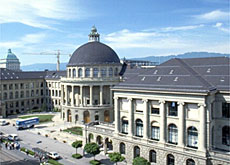Nobel prize highlights cash shortage in research

As Switzerland's Kurt Wüthrich receives the Nobel prize for chemistry, the scientific community is hoping his triumph will persuade the state to invest more in research.
The country’s cash-strapped research institutes are warning that without a substantial cash commitment they risk losing the edge.
Switzerland’s two Federal Institutes of Technology in Zurich and Lausanne have not had a funding increase in years and both say they battling to make ends meet.
Last month the Zurich Institute – where Wüthrich is based – announced it was shedding 13 professorial posts. Gerhard Schmitt, vice president of planning and logistics, told swissinfo that a number of infrastructure projects had to be cancelled or postponed.
“Our prime intention has been to keep the funding for research and teaching at an internationally competitive level.
“We have done this by basically reducing the amount of funding available for developing the Institute’s infrastructure.”
But Schmitt warns that unless an increase in public funding is forthcoming, research and teaching could be hit in the future.
The Institutes in Zurich and Lausanne are both directly funded by the federal government. Zurich receives around SFr900 million a year and Lausanne SFr400 million.
Strained resources
Lausanne’s problems lie in the huge increase it has seen in student numbers over the past 12 years – almost 50 per cent, according to vice president and research director, Stefan Catsicas.
At the same time the level of funding has barely changed and this has put a strain on the Institute’s teaching resources in particular.
“You cannot have such an increase in student numbers and a stagnation in the level of funding and still offer the same quality of teaching,” he told swissinfo.
The Wüthrich effect
Schmitt at the Zurich Institute is hopeful that Kurt Wüthrich’s winning of one half of this year’s Nobel prize for chemistry will influence both the government and popular opinion.
He says Wüthrich’s prize serves as a timely reminder that research takes years to come to fruition and it is important for everyone to realise the necessity for long-term investment in teaching and research.
“Winning the Nobel Prize takes 15 to 20 years of hard work from the person,” he said. “But the Institute also provides the framework – academically, intellectually and in terms of infrastructure – to enable this.”
Catsicas also stresses the need for long-term investment. He says that even though both Institutes have recently scored highly in an evaluation carried out by an international committee, their reputation owes a great deal to past funding and not current trends.
“What we have to do now is prepare the next 10 to 20 years,” he said. “If the government does not decide to invest massively in research and education, we will have to pay the bill later on.”
Outside funding
One potential source of funds is the private sector, and both Zurich and Lausanne have made some effort to attract money from industry.
But both Schmitt and Catsicas see dangers in relying too much on private firms.
Less than ten per cent of Zurich’s funding come from sources other than the public purse and Schmitt says that figure is unlikely to grow substantially because it would require a team dedicated solely to fundraising – a move that would redirect resources away from teaching and research.
Catsicas says that although industry can and does have a part to play in research, the Institutes must be careful not to rely too much on the private sector.
“The essential thing is that both industry and academia collaborate,” he said. “But the priority of a university is fundamental, long-term research which requires public funding to be free of any kind of [influence].”
Federal budget
Although the government has recommended an annual increase of six per cent in funding for research in Switzerland from 2004-2007, Schmitt is sceptical that the Institutes will receive that much.
He says they had initially been promised a ten per cent increase to make up for low levels of spending in the 1990s, but he expects the real increase to be around four per cent.
At a time when the government is trying to reduce its overall spending, Catsicas is urging politicians not to underestimate the importance of research in Switzerland.
“Our message to the government and the taxpayer is that for a country like Switzerland ‘grey matter’ – education at the highest level and research – are the main assets.
“They should probably be the last items to be cut.”
swissinfo, Jonathan Summerton
Kurt Wüthrich shares this year’s Nobel Prize for Chemistry for his research into biological macromolecules.
Switzerland’s research institutes are hoping his prize will encourage government and the public to stump up more cash for research.
Wüthrich is based at the Federal Institute of Technology in Zurich, which is to cut 13 professorial posts over the next five years.
The government has recommended an average yearly increase of six per cent in spending on education, research and technology for the period 2004-2007.
Wüthrich is the seventh Swiss scientist to win the Chemistry prize – the last Swiss was Richard Ernst in 1991.

In compliance with the JTI standards
More: SWI swissinfo.ch certified by the Journalism Trust Initiative









You can find an overview of ongoing debates with our journalists here . Please join us!
If you want to start a conversation about a topic raised in this article or want to report factual errors, email us at english@swissinfo.ch.